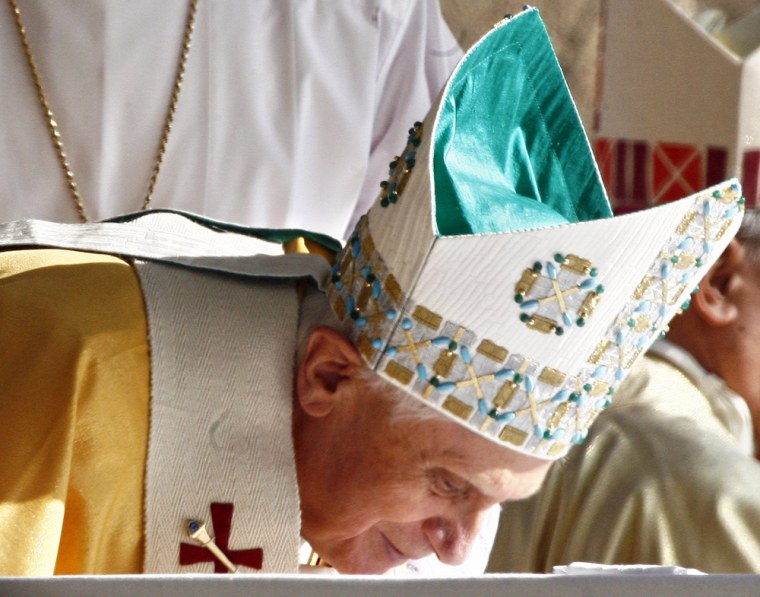Pope Benedict XVI held an intimate Mass under a flower-covered canopy at one of the holiest Christian places in this predominantly Muslim country Wednesday, as riot police and soldiers toting submachine guns patrolled a hillside nearby.
Hours into Benedict’s trip, al-Qaida in Iraq denounced Benedict XVI’s visit to Turkey, calling it part of a “crusader campaign” against Islam.
In Istanbul, Vatican officials said the remark shows the need for faiths to fight “violence in the name of God.”
The Mass was held next to the ruins of a house where the Virgin Mary is thought to have spent her last years. Security forces had sealed off the area and only 250 guests were invited, making it one of the smallest crowds to attend a papal Mass.
Afterward, Benedict lifted a giant Turkish flag as he made his way through the crowd, greeting worshippers and shaking hands. Many reached out to touch him and cried “Benedetto,” his name in Italian.
‘Spiritual closeness’
Benedict held the Mass as part of his efforts to reach out to the Christian minority in Turkey, even as he seeks dialogue with Muslims who were angered over a speech he made in September in which he cited a medieval text that linked Islam and violence.
“I have wanted to convey my personal love and spiritual closeness, together with that of the universal church, to the Christian community here in Turkey, a small minority which faces many challenges and difficulties daily,” the pope said.
In response, Al-Qaida in Iraq issued its statement on an Islamic militant Web site it often uses to post messages.
“The pope’s visit, in fact, is to consolidate the crusader campaign against the lands of Islam after the failure of the crusader leaders ... and an attempt to extinguish the burning ember of Islam inside our Turkish brothers,” it said.
Vatican spokesman Rev. Federico Lombardi said “neither the pope nor his entourage are worried” by the statement.
“This type of message shows once again the urgency and importance of a common commitment of all forces against violence,” Lombardi said. “It also shows the need of various faiths to say ’no’ to violence in the name of God.”
Benedict also honored the Rev. Andrea Santoro, who was shot by a Turkish teenager in February in his church in the Black Sea port of Trabzon. The attack was believed linked to Muslim outrage over the publication of caricatures of the Prophet Muhammad in European newspapers. Two other Catholic priests also were attacked in Turkey this year.
On Tuesday, the pope urged religious leaders of all faiths to “utterly refuse” to support any form of violence in the name of faith. He sought a careful balance as he extended a hand of friendship and “brotherhood” to Muslims on his first visit to a Muslim country, and even expressed support for measures that Turkey has taken in its campaign to join the European Union.
On Wednesday, Benedict cited one of his predecessors, Pope John XXIII, who served as a papal diplomat in Turkey in the 1940s. He quoted him as saying, “I love the Turks. I appreciate the natural qualities of these people, who have their own place reserved in the march of civilization.”
Tight security for visit
A paramilitary helicopter hovered low over the crowd as the pope arrived Wednesday, and registered guests went through three separate metal detectors before reaching the sacred site. A military policeman said security details were not given out to officers until the last minute, apparently to keep the pope’s exact travel route secret.
St. John the Apostle is believed to have brought the Virgin Mary to the house to care for her after Jesus’ death. Another belief maintains that the Virgin Mary died in Jerusalem.
The ruins of the house, whose earliest foundations date to the first century, have become a popular pilgrimage site since the 1950s. A chapel was built over the ruins, and some believe in the healing powers of both the chapel and waters flowing from a nearby spring. The site is nestled on a wooded mountain between the ancient city of Ephesus and the town of Selcuk, near the Aegean coast.
Of Turkey’s 70 million people, some 65,000 are Armenian Orthodox Christians, 20,000 are Roman Catholic, and 3,500 are Protestant, mostly converts from Islam. Another 2,000 are Greek Orthodox and 23,000 are Jewish. The European Union has called on Turkey to expand religious freedoms.
The pope planned to travel to Istanbul later Wednesday to meet Bartholomew I, leader of the world’s 300 million Orthodox Christians. The two major branches of Christianity represented by Bartholomew and Benedict split in 1054 over differences in opinion on the power of the papacy. The two spiritual heads will meet in an attempt to breach the divide and reunite the churches.
